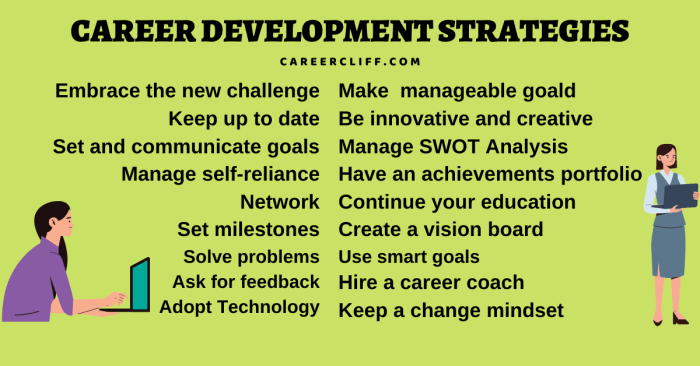Career Growth Strategies are key to unlocking your full potential and propelling you towards success in your chosen field. From identifying the right path to overcoming obstacles, this guide will equip you with the tools needed to thrive in your career.
Importance of Career Growth Strategies

Having a well-thought-out career growth strategy is crucial for professional development as it provides a roadmap for individuals to navigate their career paths effectively. By setting clear goals and outlining steps to achieve them, individuals can better focus their efforts and make informed decisions to progress in their careers.
How Career Growth Strategies Help Individuals Progress
Career growth strategies can help individuals progress in their careers by helping them identify their strengths, weaknesses, opportunities, and threats. By conducting a self-assessment and understanding their skills and interests, individuals can align their career goals with their personal aspirations. Additionally, career growth strategies can help individuals stay motivated and focused on their professional development by providing a sense of direction and purpose.
- Setting SMART goals: Successful individuals often set Specific, Measurable, Achievable, Relevant, and Time-bound goals to track their progress and stay motivated.
- Continuous learning and development: Implementing a career growth strategy involves investing in continuous learning and skill development to stay relevant in a rapidly changing job market.
- Building a strong network: Networking plays a crucial role in career growth, as it can open up new opportunities, provide mentorship, and support career advancement.
Examples of Successful Individuals
-
Elon Musk:
The CEO of Tesla and SpaceX is known for his ambitious career growth strategies, which have led him to revolutionize the automotive and space industries.
-
Oprah Winfrey:
The media mogul and philanthropist strategically expanded her career from television hosting to building a multimedia empire, showcasing the power of effective career growth planning.
Types of Career Growth Strategies

When it comes to advancing in your career, there are various strategies you can employ to achieve your goals. Let’s explore different types of career growth strategies and their advantages and disadvantages.
Skills Development, Career Growth Strategies
One key strategy for career growth is focusing on skills development. This involves continuously improving your abilities and acquiring new skills relevant to your field.
- Advantages: Enhancing your skills can make you more valuable to employers, increase job satisfaction, and open up new opportunities for career advancement.
- Disadvantages: It may require a significant time commitment and investment in training or education.
For example, Sarah, a marketing professional, decided to pursue a certification in digital marketing to stay competitive in the industry. This additional skill set helped her secure a promotion to a senior marketing manager role.
Networking
Networking is another important career growth strategy that involves building relationships with professionals in your industry.
- Advantages: Networking can help you access job opportunities, gain insights from experienced professionals, and build a strong professional support system.
- Disadvantages: It can be time-consuming and may require stepping out of your comfort zone to connect with new people.
For instance, John, an IT specialist, attended industry conferences and networking events to expand his professional network. Through these connections, he learned about job openings at a top tech company and landed a higher-paying position.
Mentorship
Seeking mentorship from experienced professionals in your field can also be a valuable career growth strategy.
- Advantages: A mentor can provide guidance, advice, and support to help you navigate your career path effectively.
- Disadvantages: Finding the right mentor and establishing a meaningful relationship can take time and effort.
For example, Emily, a young lawyer, sought mentorship from a senior partner at her firm. With her mentor’s guidance, she was able to secure high-profile cases and advance to a partner position within a few years.
Creating a Personalized Career Growth Plan: Career Growth Strategies
Creating a personalized career growth plan is essential for achieving your professional goals and advancing in your career. By following specific steps and setting SMART goals, you can tailor your plan to align with your personal interests, skills, and aspirations.
Steps to Create a Personalized Career Growth Plan
- Self-assessment: Reflect on your strengths, weaknesses, interests, and values to identify areas for growth.
- Goal setting: Define specific, measurable, achievable, relevant, and time-bound (SMART) goals that align with your career aspirations.
- Research: Explore different career paths, industries, and opportunities to determine the best fit for your skills and interests.
- Skill development: Identify the skills you need to succeed in your desired career and create a plan to acquire or enhance them.
- Networking: Build relationships with professionals in your field of interest to gain insights, mentorship, and potential opportunities.
Setting SMART Goals for Career Growth
SMART goals are Specific, Measurable, Achievable, Relevant, and Time-bound.
- Specific: Clearly define what you want to achieve in your career growth plan.
- Measurable: Establish criteria to track your progress towards achieving your goals.
- Achievable: Set realistic goals that you can attain with effort and commitment.
- Relevant: Ensure that your goals align with your long-term career objectives and personal values.
- Time-bound: Set deadlines for achieving each goal to create a sense of urgency and focus.
Aligning Personal Interests, Skills, and Goals with Career Growth Strategies
- Identify your passions and interests to align them with career opportunities that bring you fulfillment.
- Evaluate your current skills and strengths to determine how they can contribute to your career growth.
- Set goals that leverage your interests and skills while addressing areas for improvement to enhance your career prospects.
- Regularly assess your progress and make adjustments to your career growth plan to stay aligned with your evolving interests and goals.
Overcoming Challenges in Career Growth
In the journey towards career growth, individuals often face various challenges that can hinder their progress. It is essential to identify these obstacles and implement strategies to overcome them effectively.
Lack of Resources
One common challenge faced by individuals is the lack of resources such as access to training programs, mentorship opportunities, or financial support. In such situations, it is crucial to explore alternative resources like online courses, networking events, or seeking guidance from industry professionals.
Time Constraints
Another obstacle to career growth is time constraints, especially for those balancing work, family, and personal commitments. To overcome this challenge, individuals can prioritize tasks, delegate responsibilities, and create a structured schedule that allows for dedicated time towards skill development and career advancement.
Fear of Failure
The fear of failure can often paralyze individuals and prevent them from taking necessary risks to achieve career growth. It is important to cultivate resilience and develop a growth mindset that embraces challenges as opportunities for learning and growth. By reframing failures as valuable lessons, individuals can overcome this fear and continue to progress in their careers.
Importance of Resilience and Adaptability
Resilience and adaptability are key qualities that can help individuals navigate challenges effectively and achieve career growth. By staying flexible, open to new opportunities, and willing to learn from setbacks, individuals can overcome obstacles, bounce back stronger, and ultimately reach their career goals.
